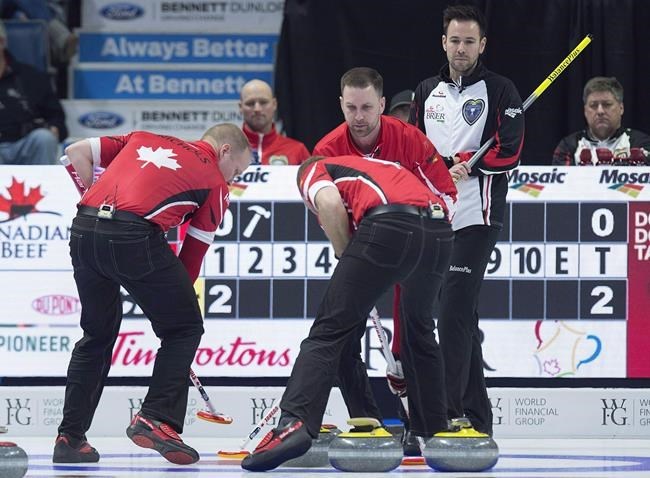With so many top Canadian men's curling teams opening this season with revamped lineups, who will start hot and who will be slow out of the gates?
"That's what we're all talking about, how interesting the different lineup changes are," said Toronto skip John Epping, whose team has a new look featuring a couple of names familiar to curling fans.
Other than teams skipped by 2014 Olympic champion Brad Jacobs and reigning Canadian champion Brad Gushue, there's hardly a big-name foursome that remained fully intact for 2018-19.
Movement between teams intensifies after a Winter Olympics as curlers try to form teams that can win the next trials and go for Olympic gold.
A couple of established, successful skips have moved down the lineup to play for other skips.
Instead of trying to oust each other from Manitoba playdowns, Mike McEwen and Reid Carruthers have joined forces, with Carruthers calling the shots and McEwen throwing fourth stones.
After seven years skipping Saskatchewan at the national championship, Steve Laycock is playing third for Jim Cotter of Vernon, B.C.
Those moves had a knock-on effect with their former teammates joining other squads.
Laycock's vice Matt Dunstone now skips a new lineup that includes Carruthers' former third Braeden Moskowy.
Calgary's Kevin Koe, who placed fourth in February's Winter Games, recently won the first men's leg of the World Cup of Curling with former McEwen vice B.J. Neufeld at third and new second Colton Flasch.
Glenn Howard's son Scott has moved up to play third with Tim March, formerly of Team Epping, rotating in at lead.
Epping got off to a quick start with vice Mathew Camm and new front end Brent Laing and Craig Savill.
They won the World Curling Tour's Shorty Jenkins Classic in Cornwall, Ont., earlier this month beating both Jacobs and reigning Olympic champion John Shuster of the U.S. en route to the title.
Laing and Savill were Howard's second and lead respectively for a decade and won a pair of Canadian and world titles during that span.
Laing went onto play for other teams, including Koe's Olympic squad. Savill has returned to competitive curling after receiving treatment for Hodgkin's lymphoma.
"Even though they haven't played together that last four years, they still remained great friends and I think the excitement for the two of them to get back together and for Craig to be back in the game, you can just tell they were right back where they left off," Epping said.
"Brent and Craig played together for over 10 years. I figured they would show up and mesh early and I think it's the experience side that would help that."
Without an Olympic Games, trials or pre-trials on the curling calendar this winter, the premiere events will be the seven Grand Slams that offer a total of $2.1 million in prize money for men's and women's teams, as well as December's $140,000 Canada Cup of Curling in Estevan, Sask.
The first Grand Slam, the Princess Auto Elite 10, is Wednesday to Sunday in Chatham, Ont.
The men's field will include Koe, Epping, Jacobs, Gushue, Howard, Carruthers and Winnipeg's Jason Gunnlaugson, as well as Sweden's Niklas Edin and Scotland's Bruce Mouat and Ross Paterson.
The Tim Hortons Brier, the Canadian men's championship, will be March 2-10 in Brandon, Man. Lethbridge, Alta., is the host city of the 2019 men's world curling championship March 30 to April 7.
It can go two ways early in the season for a new team, Epping said.
"You expect you might struggle early because you're obviously getting used to each other, it's a new chemistry and you're trying to fit in with each other and do what's best for each other," he explained. "You don't necessarily know what makes each other better.
"On the other hand, it can go well because, we call it the honeymoon stage, where things are pretty easy, you're kind of laid back and relaxed and it's fresh and feels great. There's not that added pressure.
"I think teams that get hot early that's great, we'll see how they do when they lose a couple of games and they have to regroup and show resilience as a team. That to me really shows the true test and nature of a team."
Donna Spencer, The Canadian Press
